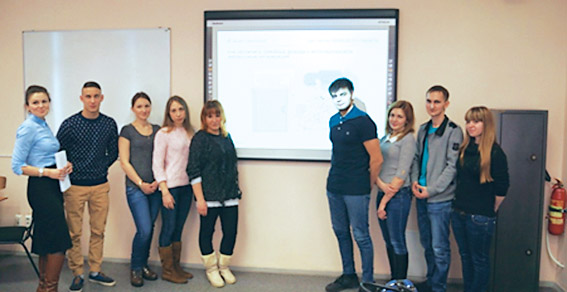
Within realization of one of the main activities of the UNESKO-UNEVOK International Center “Youth unemployment and development of skills” the Agency of educational technologies of our UNESKO-UNEVOK Center is occupied with questions of increase of the budgetary literacy of the population of Bashkortostan Republic.
On the 25 of September, 2013 in the Russian Government Analytical Centre the Round table “Completeness and Availability to Society of Information Provided in the Budget Model for Citizens” took place. Representatives of the Ministry of Finance of the Russian Federation and Open Government, experts, teachers of higher education institutions took part in it.
T.A. Nigmatullina, the head of the UNESKO-UNEVOK Center in the Russian Federation on the basis of the Bashkir institute of social technologies presented the project “Youth resource: technologies of promotion of the “budget for citizens” project in mass media”, developed by student’s community within Agency of design technologies. She shared with attendees experience of our UNESKO-UNEVOK Center for increase of financial and budgetary literacy of the population and also presented the algorithm of the actions directed to assistance of information openness of the state and society, increase of extent of participation of citizens in social and political life.
A. Barakhovsky, the managing director of the Center of researches of the budgetary rela- tions and D. Satin, the adviser to the Minister of Telecom and Mass Communications, informed participators on results of research of target audiences for “the budget for citizens”. They noted that attendance of the majority of government resources remains at a low level because there is no accurate definition of target audience. As a result as the main target audience of “the budget for citizens” was chosen “active youth”: “young couples” and “young parents” aged from 20 till 40 years. During the Round table experts noted: “It is interesting that in this target audience, according to participants, women are the most interested in understanding of the budgetary information”. In their opinion, the interactive services allowing to participate in decision-making and to influence a situation are necessary for citizens with the most active living position. And for low and medium-active citizens printing materials (brochures, booklets, posters in transport, etc.)
At Financial university at the Government students helped to create channels of distribution of information and they were also invited to the Round table . “Address groups are both youth and adult citizens at the age of 35–40 years, and citizens of pre-retirement and advanced age over 60 years. And it is necessary to allocate small business entities considering priorities of small and medium business”, — Inna Rykovathe, deputy director of university on science specified. According to her, “hot lines”, special sections on the websites, media content, the centers of the budgetary education can be tools for those who have time. Inquiry of modern society formulated by the youth is “obtaining information, without stopping”. For example, on posters in the subway, the airports, at stations it is possible to place in one line information on these or those parameters of transportation costs. On social networks it is possible to create groups, create applications for tablets and smartphones. “Within the Open government it can be short materials on the website, very short lectures”, — Inna Rykova sad. Among other proposals of students there are lectures of experts, posters and commercials in share taxis, banner advertizing. The main thing that in these materials the resource where information can be obtained in expanded form was specified.
There is a similar experience of creation of resources, it was presented by R. Shcherbatyuk, the deputy minister of finance of Krasnoyarskiy Krai. In this region “the budget for citizens” is created in the form of comics, reference books and short business publications since 2007. “On a regional portal the separate heading “Regional Budget” is created. There are also feedback forms: vote for these or those objects and an opportunity to send the message”, — the speaker noted. According to him, the price of the printing of reference books is law, about 100 thousand rubles.
B. Grozovskiy the observer of Forbes raised a subject of insufficient transparency of the budgetary process and suggested the Ministry of Finance of the Russian Federation to publish, for example, explanatory notes to budget bills. And he suggested to connect non-profit organizations which could also become controllers of performance of these or those articles of the budget to process of involvement of citizens.
“The Ministry of Finance is interested in the work like this, — Andrey Blochin, the director of the department of the budgetary policy of the Ministry of Finance emphasized. — I really favour civil activity to the budget because I hope that we will add experience to institutes of civil society”.
And in our turn we are sure that financial and budgetary literacy first of all will allow young people to gain necessary skills for work, for example, to do short-term and long-term financial forecasts in the sphere of small and medium business, etc.

 September 25th, 2016
September 25th, 2016  ALINA B.
ALINA B.  Posted in
Posted in